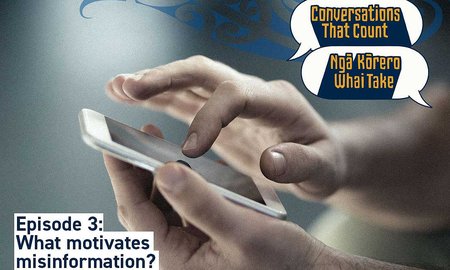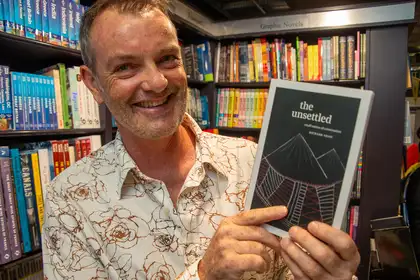
Professor Richard Shaw at his book launch for The Unsettled.
Two years after the release of his memoir The Forgotten Coast, Professor Shaw continues to delve into the complexities of owning one’s past in a decolonising world. His new publication, The Unsettled, shines a spotlight on the stories of Pākehā with long settler histories confronting the reality of their families’ ‘pioneer stories’.
Professor Shaw says the idea for this book came soon after the publication of his memoir, as he found it stirred up emotions and stories around the consequences of Māori land confiscation.
“There was some angry feedback, both regarding the book and an article I wrote for The Conversation, from those who were not keen on what I had to say about the ongoing consequences for Taranaki Māori or the ways in which the benefits of that process of land removal continues to accrue for people like me. But I mostly heard from Pākehā, old, young, urban, rural, who wanted to share their own thoughts about how to live with the colonial past, present and future of this country.”
Recognising the value in both sets of voices, those questioning the foundations of their own histories built on aggressive acts of colonisation and land confiscation, Professor Shaw says he was inspired to write a book about them.
“Behind the anger, I heard an underlying fear, a reluctance to confront the real issue at hand. However, alongside that fear and discomfort, there is a growing appetite amongst many non-Māori for a more forthright, historically-informed conversation about what really went on here during peak colonisation and about its enduring consequences in contemporary Aotearoa.”
The Unsettled weaves together stories belonging to Professor Shaw and other New Zealanders attempting to reconcile their pasts with their presents and possible futures. As the title suggests, the work is unsettling, but Professor Shaw says he admires the courage of those engaging with it.
“The people who got in touch with me are feisty, thoughtful, honest and compassionate. You need to mind your step when you journey into the territory that The Unsettled traverses, which includes the abandoned, forgotten corners of families’ stories and the nation’s foundation narratives. There is something in those whose voices are heard in the book – a sense of fundamental fairness and justice that has prompted them to start asking challenging questions of their own pasts.”
A common response to this work is the idea that as time goes on, the descendants of old settler families are an ever-decreasing subset of the population, with the movement of time suggesting they become more removed from the history of the land their ancestors farmed. Professor Shaw says that despite this, coming to terms with one’s history still matters.
“It matters because many of us, whose families made a start in Aotearoa because of colonisation, continue to benefit from that history, even if we rarely acknowledge it. None of us are personally responsible for these historical facts but we do benefit from them, just as Māori continue to live with the consequences of that dishonourable behaviour. Should we not at least reflect on this?”
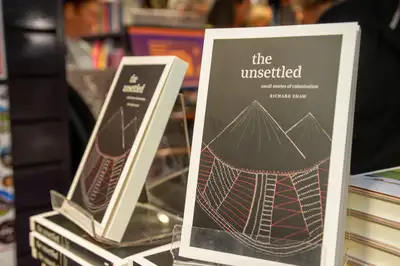
The cover art of The Unsettled also draws from Professor Shaw’s memoir, as it was created by his friend and social anthropologist Dr Carolyn Morris after reading it. Titled The Agricultural Campaign, a reference to a line used in the book regarding Professor Shaw’s great-grandfather’s farming of confiscated land, the imagery prominently features Taranaki Maunga but includes ploughed fields, fences and an invasion road associated with Parihaka.
“It’s an unsettling piece of work and I’m very grateful Carolyn allowed me to use it for The Unsettled – I love the cover!” Professor Shaw says.
It is his hope that this book helps to fuel further conversations for non-Māori, regardless of how challenging they may be. He says he’d like more New Zealanders to look deeper into how their personal circumstances today are shaped by the big story of colonisation.
“I hope The Unsettled shows readers how many people’s small family stories have been shaped by colonisation, and in doing so, helps them approach decolonisation as a personal, intimate journey of understanding. Setting aside guilt and anger to take responsibility for learning a more truthful, better informed personal history can be liberating.
“It is not easy or especially comfortable, but every single person I’ve listened to who is trying to do it tells me that they are gaining something by doing so. This could be the way forward to allow us all to find our way to a better future.”
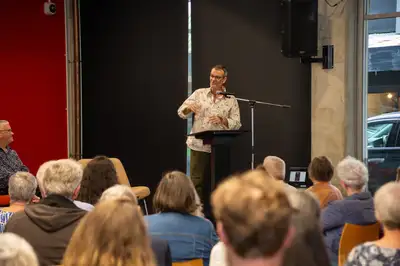
Professor Shaw speaking at the book launch for The Unsettled.
About the author
Richard Shaw is a Professor of Politics at Te Kunenga ki Pūrehuroa Massey University’s College of Humanities and Social Sciences. He is a regular commentator on political issues and the author of a number of academic publications about government, parliament and politics in Aotearoa New Zealand.
Find out more about his published books, including The Unsettled, here and access his The Conversation articles here.
Related news
Opinion: Let’s talk about equality – and the constitution
By Professor Richard Shaw
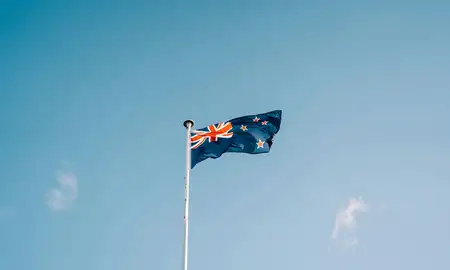
Memoir explores racism, the Catholic church, and fathers
Professor Richard Shaw has launched his memoir 'The Forgotten Coast', an examination of colonial privilege, his family's Catholicism and his relationship with his father.
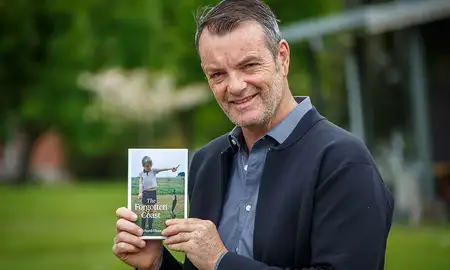
The complicated world of online misinformation and disinformation
In episode three of Conversations That Count - Ngā Kōrero Whai Take, our guests Professor Richard Shaw and Jess Brenton-Shaw dive into this complicated issue.
